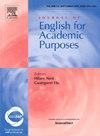在EMI中所有的作业都是平等的吗?公平和学生参与的类型
IF 3.4
1区 文学
Q1 EDUCATION & EDUCATIONAL RESEARCH
引用次数: 0
摘要
随着英语媒介教学(EMI)在非英语国家大学的不断扩展,作业设计在塑造公平的内容学习成果方面的作用仍未得到充分探讨。本研究的问题是:在EMI中,所有的作业都同样有效吗?为了解决这个问题,本文引入并实证评估了一种通用作业设计(UAD)类型,该类型由六种任务类型(基础、解释、分析、协作、应用和综合)组成,旨在支持多语言内容课堂中的理解、参与、公平和学术语言发展。该研究利用来自日本的三年多机构数据集,包括电子档案、课后反思和CEFR A2-C2级别的访谈,研究了作业类型如何影响学生的参与和感知学习。结果表明,虽然基础任务和协作任务可以提高语言可及性和自信心,但分析和综合任务只有在精心搭建的情况下才能培养更高层次的思维。在低水平学习者中,反思和应用任务在减少焦虑和支持自我表达方面特别有价值。这种类型学以学习通用设计(UDL)、社会文化理论和基于类型的教学法为基础,为EMI从业者提供了一个可扩展的、循证的框架。该研究通过缩小EMI的设计-性能差距,并确定促进跨熟练程度的包容性、学科敏感性学习的作业策略,为学术英语(EAP)奖学金做出了贡献。本文章由计算机程序翻译,如有差异,请以英文原文为准。
Are all assignments created equal in EMI? A typology for equity and student engagement
As English Medium Instruction (EMI) continues to expand across non-Anglophone universities, the role of assignment design in shaping equitable content learning outcomes remains underexplored. This study asks: Are all assignments equally effective in EMI? To address this question, it introduces and empirically evaluates a Universal Assignment Design (UAD) typology consisting of six task types (foundational, interpretive, analytical, collaborative, applied, and integrative) designed to support comprehension, engagement, equity and academic language development in multilingual content classrooms. Drawing on a three-year, multi-institutional dataset from Japan, including e-portfolios, post-course reflections, and interviews across CEFR A2–C2 levels, the study examines how assignment types influence student participation and perceived learning. Results show that while foundational and collaborative tasks improve linguistic accessibility and confidence, analytical and integrative assignments foster higher order thinking only when carefully scaffolded. Reflective and applied tasks were especially valued for reducing anxiety and supporting self-expression among lower-proficiency learners. Grounded in Universal Design for Learning (UDL), sociocultural theory, and genre-based pedagogy, this typology offers a scalable, evidence-informed framework for EMI practitioners. The study contributes to English for Academic Purposes (EAP) scholarship by bridging the design–performance gap in EMI and identifying assignment strategies that promote inclusive, discipline-sensitive learning across proficiency levels.
求助全文
通过发布文献求助,成功后即可免费获取论文全文。
去求助
来源期刊

Journal of English for Academic Purposes
Multiple-
CiteScore
6.60
自引率
13.30%
发文量
81
审稿时长
57 days
期刊介绍:
The Journal of English for Academic Purposes provides a forum for the dissemination of information and views which enables practitioners of and researchers in EAP to keep current with developments in their field and to contribute to its continued updating. JEAP publishes articles, book reviews, conference reports, and academic exchanges in the linguistic, sociolinguistic and psycholinguistic description of English as it occurs in the contexts of academic study and scholarly exchange itself.
 求助内容:
求助内容: 应助结果提醒方式:
应助结果提醒方式:


